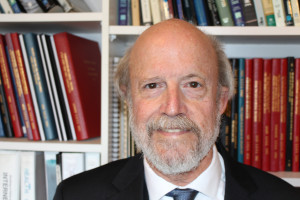The Plank Center recognizes and promotes the critical role mentors play in helping to develop leaders and advance the profession and honors leaders throughout the profession who, by word and deed, have demonstrated a superior commitment to mentoring others, and who are committed to accelerating the success of others in the field at its annual Milestones in Mentoring Gala.
Our question and answer series introduces the 2019 Milestones in Mentoring award recipients.
 Meet Dr. David Dozier.
Meet Dr. David Dozier.
Dr. David M. Dozier, professor emeritus at San Diego State University, is an award-winning scholar of public relations and communication management. The author or co-author of over 100 books, book chapters, articles, and scholarly papers, his works have been cited by other scholars over 4,000 times and over 2,000 times in the last five years.
What is your mentorship approach and what advice do you give your mentees?
Mentoring is organic. If you like to use a checklist approach, you’re not mentoring. Start with identifying your mentee’s interests and concerns. Build on that.
What advice would you tell your early-career self with respect to finding a mentor?
Find a mentor who has the time, interest, and expertise to assist you.
What have you found to be the most important key to having a successful mentor/mentee relationship?
As a mentor, you need to help your mentee grow to the point where that mentee doesn’t need you anymore. Provide encouragement all along the way.
What is one powerful thing you’ve learned from mentoring someone?
I’ve learned that, as mentee’s grow, what they need from a mentor changes. This is an organic process.
What top three ways our profession’s best and brightest can be mentored right now so they will be prepared to assume leadership positions in the future?
- Solid education in the strategic management approach; some PR scholarship serves the parochial interests of faculty and not the needs of students or the practice.
- Infuse mentor/mentee discussions of leadership with discussions of ethics.
- Emphasize that participating in management decision-making requires that we in PR bring something unique and valued to decision making.
What do you see as the differences between mentorship and sponsorship, and how do you approach each one?
I really don’t have any involvement with sponsorship, so I haven’t anything relevant to say about that.
Please summarize your professional career including its high and low points.
My low point was as an assistant professor with no publications. My high point was organizing the military Public Affairs Officers Program at SDSU. I had several outstanding mentors along the way. The late Allen Center and Glen Broom really helped me organize my thinking about PR as a practice and my role as an educator and researcher. My preparation at Stanford under the mentorship of the late Ev Rogers was the single most contributor. I learned how to do social science research and do it well.
Discuss the importance of diversity and inclusion in the profession, including the best practices you and your team use to develop and implement strategic programs to grow, mentor and retain diverse populations.
This question seems odd, since I’m an academic, not a working practitioner. I have long advocated diversity on our faculty at SDSU. When I joined SDSU in 1980, the faculty was all white, all straight, and had only one woman. Now we are much more diverse regarding ethnicity, gender, and sexual orientation. We did this one hire at a time.
There is a myriad of changes around us. What issues have or will become a “wake up call” to the profession?
Our primary challenge is the perception of many Americans that PR is a sleazy endeavor that attempts to justify or cover up organizational misconduct. Unfortunately, that’s what many practitioners do. Good, ethical PR starts by changing organizations from the inside, before telling your organization’s story to the outside world.
What’s your favorite way to spend a Saturday?
Writing, reading, walking, and swimming.
Favorite app?
Google GPS for navigation; Washington Post for news updates; spell check in Word (not really an app, I suppose)
If given the choice to trade places with anyone (living or dead) for one day, who would it be and why?
Neil Armstrong stepping onto the Moon; I always wanted to be an astronaut.
Favorite place to vacation and why?
Costa Rica. Pura Vida!
My leadership tip is…
Listen before speaking; count votes
My mentorship tip is…
Listen before advising.
Every mentor is…
Trying to help.
Lesson that took you the longest to learn…
Know when to hold them, know when to fold them, know when to walk away, know when to run.
Published July 16, 2019
More from David: